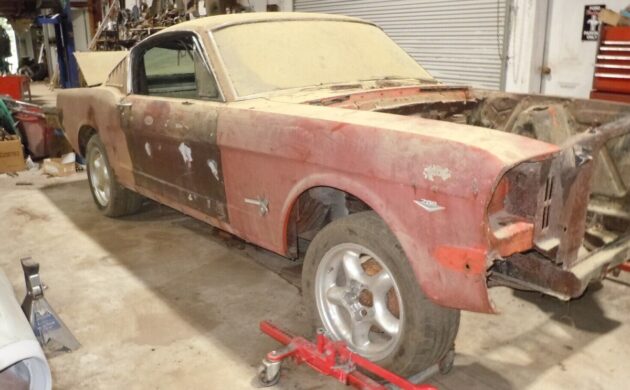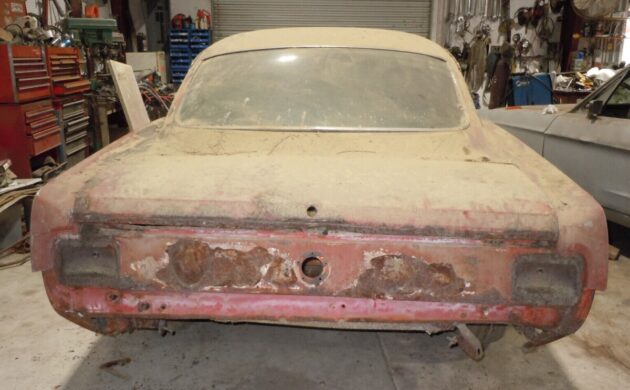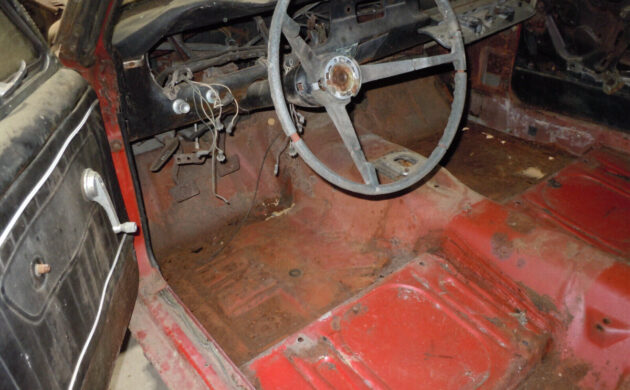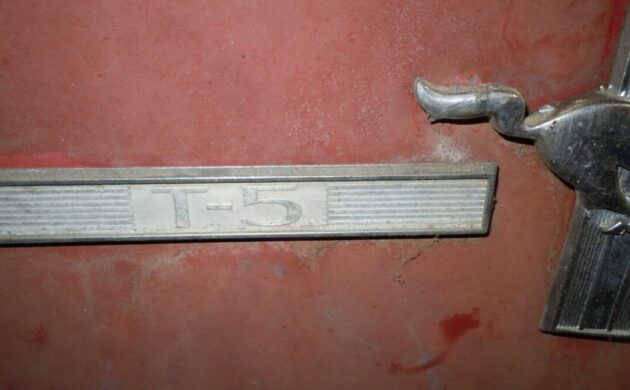Ford hit a snag when trying to export its successful new Mustang to Germany in 1965. A truck manufacturer over there already owned the rights to the name. The company’s workaround solution (through 1979) was to de-badge the cars as Mustangs and call them T5s instead (the internal project code for the Mustang at Ford). This rare example was in an accident years ago and became a parts car, so most of its important stuff is long gone. It could continue to be used as such or undergo an arduous restoration. Located in Hampton, South Carolina, this Germany-bound pony is available here on eBay where the bidding stands at $2,800 (reserve not met). Thanks for this unusual tip, T.J.!
Without a build sheet or some other documentation, T5s are said to be hard to validate. For 1965 and 1966 T5s, the hub caps were modified with a plain black center and the word “Mustang” was removed from the horn ring, rear gas cap, and other places on the auto. Instead, a small T5 badge was used. To meet the standards of the German market, some of the exterior lighting was changed out along with some tinkering done with the suspension. Many of the cars were sold to servicemen stationed in Germany who brought them home with them after their tour was up. That may be how this T5 found its way to South Carolina, but we don’t know.
After getting involved in a front-end collision, this T5 spent 20 years inside a garage. The frame rail is pushed back a bit and that was more than someone wanted to deal with, so its parts began to get harvested. The original 289 cubic inch V8 and 4-speed manual transmission, for example, disappeared long ago. The same is true for the interior, gas tank, and maybe the hood.
All early T5s were built in either of Ford’s Dearborn, Michigan or Metuchen, New Jersey plants, and the VIN on the seller’s car identifies the latter, so that’s a start to verifying it as a T5. This car also has a T5 emblem on the front fenders and the seller says the original door tag, built tag, and apron stamps have survived, perhaps helping the cause. Restoration of this Ford will involve sourcing a lot of components and some of the T5-specific stuff went out of production ages ago. Also, in determining whether to do this out not, one of the questions must be is a Mustang that’s not badged as Mustang worth more than one that is?







Show me any ’64-’68 Mustang with an original, dent-free rear panel, and that will be my day to buy a lottery ticket.
Have you ever noticed how just about every Chrysler/Dodge/Plymouth minivan has a dent in the tailgate?
Mine is original and undented. Rust free, not as much.
This T5 = Thrashed, Trashed, Terrible, Tired, Thrown away
This car is located almost dead center between Charleston and Savanah, a Service Member could have retired from either one of those places. Both have a beach environment, along with time spent in europe where bodies don’t last to well as it is. So I will wager this is an honest T-5. You can take the valve stem cap off and slide a whole new car under it with what is available in so far as repro parts go. Once it is completed how many other T-5’s do you imagine you will see? What is kind of cool is I bought a few mustang lapel pins from a guy in europe that were given out to T-5 customers. They are very rare state side.
Having served in the US Army in Germany, and a gearhead, I can add some info on the T5 situation.
Mustangs sold thru the AAFES [Army Air Force Exchange Service] were marked with the normal USA specifications, as the US military and US Customs required that the car be brought back to America by the returning serviceman. They could not be sold as new, or even as used cars, to the European public. The primary reason is because the cars were exempt from German taxes, both Import, VAT, and the Kraftfahrzeugsteuer [vehicle tax].
When Mustangs were sold thru German Ford Dealers they were badged as T5 cars. They were more expensive due to the shipping and import tax situation.
A US military member could buy and register a new or used T5, but a German citizen could not register a used Mustang bought from a US service member until the original import taxes were paid. And on a 2 to 3 year old Mustang, the total taxes could exceed the value of the vehicle.